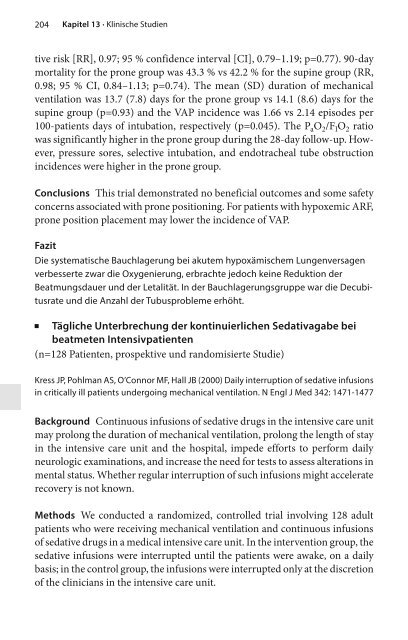Intensivmedizin Fragen und Antworten
Sie wollen auch ein ePaper? Erhöhen Sie die Reichweite Ihrer Titel.
YUMPU macht aus Druck-PDFs automatisch weboptimierte ePaper, die Google liebt.
204 Kapitel 13 · Klinische Studien<br />
tive risk [RR], 0.97; 95 % confidence interval [CI], 0.79–1.19; p=0.77). 90-day<br />
mortality for the prone group was 43.3 % vs 42.2 % for the supine group (RR,<br />
0.98; 95 % CI, 0.84–1.13; p=0.74). The mean (SD) duration of mechanical<br />
ventilation was 13.7 (7.8) days for the prone group vs 14.1 (8.6) days for the<br />
supine group (p=0.93) and the VAP incidence was 1.66 vs 2.14 episodes per<br />
100-patients days of intubation, respectively (p=0.045). The P a O 2 /F I O 2 ratio<br />
was significantly higher in the prone group during the 28-day follow-up. However,<br />
pressure sores, selective intubation, and endotracheal tube obstruction<br />
incidences were higher in the prone group.<br />
Conclusions This trial demonstrated no beneficial outcomes and some safety<br />
concerns associated with prone positioning. For patients with hypoxemic ARF,<br />
prone position placement may lower the incidence of VAP.<br />
Fazit<br />
Die systematische Bauchlagerung bei akutem hypoxämischem Lungenversagen<br />
verbesserte zwar die Oxygenierung, erbrachte jedoch keine Reduktion der<br />
Beatmungsdauer <strong>und</strong> der Letalität. In der Bauchlagerungsgruppe war die Decubitusrate<br />
<strong>und</strong> die Anzahl der Tubusprobleme erhöht.<br />
jTägliche Unterbrechung der kontinuierlichen Sedativagabe bei<br />
beatmeten Intensivpatienten<br />
(n=128 Patienten, prospektive <strong>und</strong> randomisierte Studie)<br />
Kress JP, Pohlman AS, O’Connor MF, Hall JB (2000) Daily interruption of sedative infusions<br />
in critically ill patients <strong>und</strong>ergoing mechanical ventilation. N Engl J Med 342: 1471-1477<br />
Backgro<strong>und</strong> Continuous infusions of sedative drugs in the intensive care unit<br />
may prolong the duration of mechanical ventilation, prolong the length of stay<br />
in the intensive care unit and the hospital, impede efforts to perform daily<br />
neurologic examinations, and increase the need for tests to assess alterations in<br />
mental status. Whether regular interruption of such infusions might accelerate<br />
recovery is not known.<br />
Methods We conducted a randomized, controlled trial involving 128 adult<br />
patients who were receiving mechanical ventilation and continuous infusions<br />
of sedative drugs in a medical intensive care unit. In the intervention group, the<br />
sedative infusions were interrupted until the patients were awake, on a daily<br />
basis; in the control group, the infusions were interrupted only at the discretion<br />
of the clinicians in the intensive care unit.


